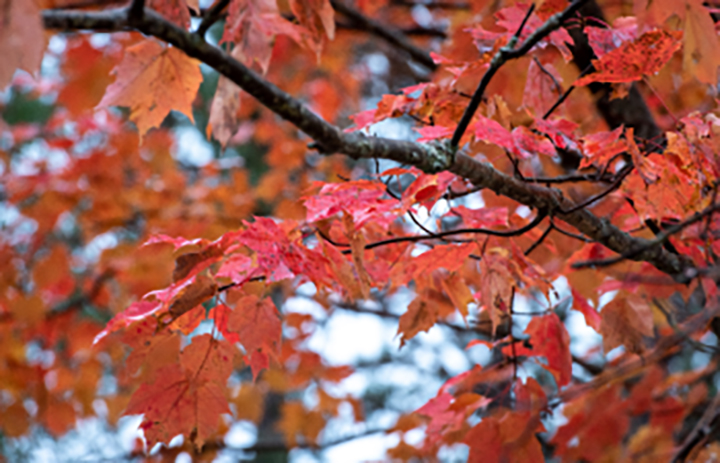Three easy ways to deal with fall leaves

Fall foliage
Peak fall color is in the Upper Peninsula right now and heading to Lower Michigan — check out the DNR’s fall color tour to see where to go for the best “leaf-peeping” opportunities.
Once the color show is over, here are a few ways to deal with the fallen leaves in your own backyard:
‘Leaf’ them be
What’s the easiest way to deal with fallen leaves? Just leave them alone — they’ll benefit wildlife and save you time and energy. If you’re worried about getting the stink eye from neighbors, you can assure them that the leaf layer is a critical part of the ecosystem. Salamanders, chipmunks, wood frogs, box turtles, toads, insects and other wildlife live in the leaf layer of the forest. Many important pollinators like moths and butterflies overwinter in fallen leaves.
If you’d like to move fallen leaves off your lawn, you can rake them into garden beds (free mulch!) where they will insulate perennials and keep soil in place during storms. Alternately, shred them with a lawn mower and let them become natural fertilizer for the yard.
Make garden gold
Another way to take care of fallen leaves is to collect them in a compost bin and let nature do the rest. They’ll break down into rich soil that plants love. If you have the space, you can also rake them directly into a vegetable patch and till them under in the spring.
A guide published by the Michigan Department of Environment, Great Lakes, and Energy, “Home composting: Reap a heap of benefits” describes how to build and maintain a compost bin.
Burn responsibly
If you choose to burn leaves, here are some important tips for this disposal method.
Before burning, remember to check for a burn permit to see if conditions are safe for burning, and know your local fire ordinances.
If you’re in the Upper Peninsula and northern Lower Peninsula, visit Michigan.gov/BurnPermit or call 866-922-BURN to find out whether burning is allowed. People who live in the southern Lower Peninsula can check with local government or fire departments.
“When burning, always have a water source nearby and never leave a fire unattended, even for a moment,” said Paul Rogers, DNR fire prevention specialist. “Debris burning is the No. 1 cause of wildfire in Michigan.”
It’s okay to burn natural materials such as leaves, branches and logs. It’s not legal to burn plastic or other trash.
Questions about burning? Visit Michigan.gov/BurnPermit or contact Paul Rogers at 616-260-8406.





